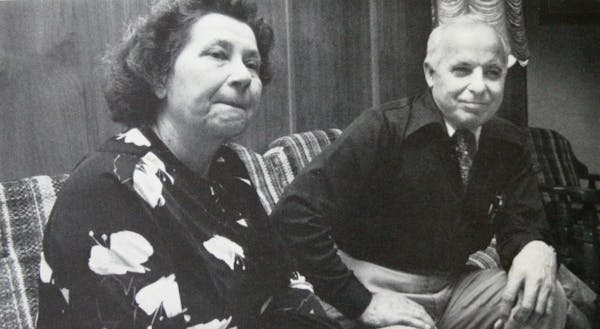Michael Karkoc, a 95-year-old retired carpenter living in northeast Minneapolis, is devastated by allegations linking him to Nazi atrocities in World War II, his son said in an interview Friday.
"He's crushed by it," Andrij Karkoc said, insisting his father is innocent and the allegations are unproven and unsubstantiated.
"These slanders will probably stand and my father will die, carrying them to his grave," his son said. "He cannot, for the life of him, understand how in America, a loyal citizen and innocent man can be so hideously lied about."
The younger Karkoc spoke out angrily on his father's behalf the day after a high German court ruled it had the authority to pursue a case against Karkoc — who served in a group called the Ukrainian Self Defense Legion.
Karkoc's son said the group consisted of roughly 100 "Ukrainian boys fighting in the forest," hoping to preserve Ukrainian independence in a swirl of wartime violence between German forces and Russian communists. Germany's federal court of Justice maintains the Legion was in cahoots with the Nazis as an SS-led outfit, so Karkoc was the "holder of a German office," in its ruling published Thursday.
While the younger Karkoc bitterly disputed that contention Friday, his father did what he does every morning: He took a stroll and even waved at a photographer. He typically walks through his neighborhood hand-in-hand with his wife of 40 years, Nadia, who is 91 and suffering from dementia.
"That's destroying my father," Andrij said. "She's 85 percent gone and he sees her disappearing day by day and then somebody comes up and hits him in the back of the head with a five-pound ball."
At a recent doctor's visit, a mass was detected on his father's bladder. That, combined with the mental anguish over his wife's Alzheimer's disease and his alleged connection with Nazis, has taken a toll.
"There is no justice here. There is no fixing it," his son said. "There is just the soul-crushing destruction of an innocent man."
Since arriving in Minneapolis, Karkoc has been a pillar in the local Ukrainian community, serving as president of St. Michael's and St. George's Ukrainian Orthodox Church, raising a family and even writing a memoir of his life in Ukraine, which he contributed to the University of Minnesota library.
His neighbors say he's a cheerful and helpful guy, a persona that contrasts with the Karkoc thrust into the international spotlight last year when the Associated Press reported it had evidence that he ordered a 1944 attack on a Polish village in which civilians were killed.
His son, a 60-year-old mortgage banker, questions those reports.
"The Germans kept great records, yet after 70 years they have no evidence of any kind — none — that he was a top commander of a Nazi-led SS unit," Andrij Karkoc said. "If it's a Nazi-led SS unit, show me the roster of who served in the unit, who commanded it? What did they do? Where are their uniforms? None of that has ever been produced."
The younger Karkoc said his father isn't talking to anyone about the allegations — not even the U.S. Department of Justice, which called and asked to speak to his father four days after the story surfaced last year.
Karkoc could lose his U.S. citizenship and be deported if the Justice Department determines he lied when he entered the U.S. as an emigrant from a displaced person camp after World War II. The Associated Press reported that Karkoc told immigration officials he hadn't fought in World War II.
"The minute he opens up his mouth," his son said, "the Department of Justice would have cause and reason. They'd say 'Prove you didn't lie.' " If Karkoc couldn't, "They'd say: 'We're deporting him.' "
Andrij Karkoc said his father neither spoke nor wrote English when he arrived after the war and many Ukrainians were being sent back to Russia, where countless were killed. He doesn't know what his father said. He might have explained his role as a Ukrainian freedom fighter and the immigration interviewer could have checked the necessary boxes and let him enter.
The AP has also reported finding no records that showed Karkoc "had a direct hand" in war crimes, but the news agency later found a Karkoc-signed Nazi document in U.S. archives, showing he had applied for German citizenship on Feb. 14, 1940.
His son said Karkoc was conscripted, "dragooned is another word," into the German army at that time when he was around 20. He had tried fleeing when the Nazis occupied Ukraine in the early-1940s and wound up forced into the German Army.
"It wasn't voluntary, he didn't even speak German," he son said. "If you want to live, you sign up."
A year after he was forced to join the German Army, Karkoc told his son he witnessed horrors at a German prison camp. That so disgusted him, Karkoc deserted and joined the Ukrainian underground as a freedom fighter. When the Germans learned of his defection, they executed 13 residents of his village, his son said.
How his father has gone from a victim of Nazi persecution to an alleged conspirator angers and mystifies his son.
"Any person that is killed unjustly deserves justice," Andrij Karkoc said. "And if there is evidence or if we can ascertain that a crime has been committed then, by all means, justice should be served, But after 70 years, just because you're pining for justice doesn't mean that you can manufacture guilty parties and that's what's being done."
Curt Brown • 612-673-4767

A tale of 124 hoarded Minnesota cats has at least a hundred happy endings

Walz, St. Paul leaders urge support for copper wire theft bill: 'We've got to get in front of it'
Body of missing canoeist, 15, recovered from southwest Minnesota lake

High winds flipped a FedEx truck traveling on Bong Bridge in Duluth

